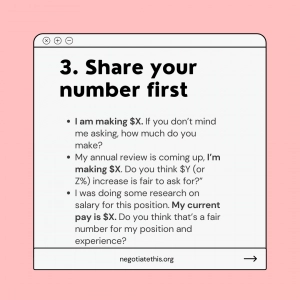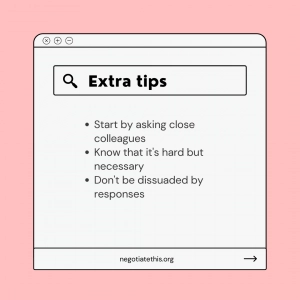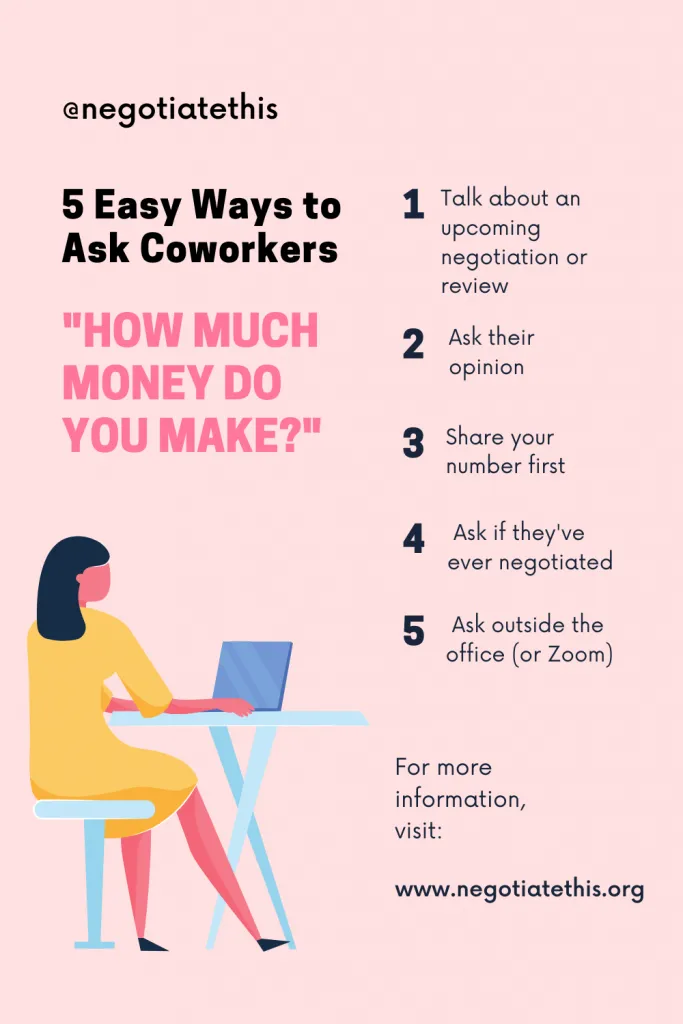How do you ask your coworkers how much money they make? It’s hard, I know. It feels like you’re overstepping a boundary. You’re crossing a line that shouldn’t be crossed.
We’ve been trained so well that talking about money is taboo and that asking about someone else’s pay is so impolite. Don’t be rude, right?! This might be where we are wrong.
Here are 5 tips to help you ask coworkers the dreaded, “How much money do you make?” with some bonus tips at the end.

This Is Where We’re Wrong
Being afraid to talk about pay has left so many behind, salary (or wage) speaking, in the workplace. Those earning the most keep it to themselves and leave the rest of us fighting for crumbs. We are done fighting for the crumbs. Talk about money. Ask your coworkers about money.
Let’s unpack how to ask, “How much money do you make?”
Talk About Money – But How?
So, we know we need to talk about money. But how? How do I ask my coworker how much they make? It will be so awkward and hard. What if they make more than me? What if I make more than them? This seems like a terrible idea… until it’s not.
“Open discussion of salaries among peers is a powerful tool to fight pay inequity” (Cornell, 2018).

This is how we fight pay inequity. We have to talk about money if we are going to make any sort of dent in the wage gap (which is extremely slow moving). “The gender wage gap has only closed by 4 cents in more than a decade” (Bleiweis, 2020). We’ve got work to do. Talk about your salary and how much you are getting paid (or not getting paid).
How Do I Talk About Money?
There are a few ways, but you know your situation best. Go with what feels right for you (even if it feels hard – because it will!). I know, I said these were the “easy ways” to ask about money (and they are – I’m giving you the script), but anything new is usually hard the first time. After you’ve done it a couple of times, it will be a piece of cake.
Here are some ideas:
- Talk about an upcoming negotiation or review
- Ask their opinion
- Share your number first
- Ask if they’ve ever negotiated
- Ask outside the office (or Zoom)

Bonus Tips:
- Start by asking close colleagues
- It’s hard but necessary
- Don’t be dissuaded by responses
1. Talk About an Upcoming Negotiation or Review

One way to seamlessly bring up pay or salary is during annual review time. Some companies may have them all at the same time and some companies may have them staggered, but everyone knows that an annual review or bi-annual review is typical in the workplace. Use it to your advantage.
This naturally occurring event (the annual review) makes bringing up pay that much easier. Since your coworkers know you have your annual review coming up, either because they have theirs too or they know it’s a normal part of the calendar year, you can bring it up for this reason.
Add it into a conversation that is already happening or let it be a stand alone comment. Mention that you have your review coming up and you are wondering if $X amount is fair.
“My annual review is coming up, I’m making $X. How much should I ask for?”
“What do you think is fair to ask for?”
“Do you think $Y (or Z%) increase is fair to ask for?”
2. Ask Their Opinion

Their facial expression may tell you all you need to know. After you let them know how much you were going to ask for, read their facial expression. Is it of surprise? Shock? Is it of dread because they just found out they’re so severely underpaid? Did they laugh and mock you because that seems like way too much? Or way too little? Whatever their response is, it can be a good indicator of what they think of your pay, whether it’s too high or too low.
Now directly ask them.
“My annual review is coming up. I’m planning to ask for $Y more.“
“Do you think that’s fair?”“Is that too low?”
“Too high?”
“Should I ask for more?”
This is when they can let you know their thoughts. They may let you know how much they are making or how much they asked for. If they tell you they asked for $X more, add in:
“Do you mind me asking how much you are making now?”
Another option is to express your concern. If that feels too direct, ask them for a range.
“I’m worried I’m being underpaid. Do you mind me asking your salary?”
Can I ask what your salary range is?”
Pause
After you ask, pause. This part is important. Pause. Let them decide. It might be awkward, but they will likely let you know. If it looks like they are in a lot of pain to be asked this question, you can add in (after you have WAITED a few moments), “No worries, you don’t have to answer if you don’t feel comfortable. I just wanted to get your perspective on what I should ask for,” and turn it back to your situation. There you go. Easy out. But give it wait time because they will likely respond.
3. Share Your Number First

Sharing your number first can show that it is a safe space for sharing, that you have already confided in them, so they feel comfortable to share with you.
“My annual review is coming up, I’m making $X. Do you think $Y (or Z%) increase is fair to ask for?”
It’s Not Annual Review Time – How Do I Share?
Just add it into conversation. Start out with how you were doing market research for your position.
“I was doing some research on salary for this position. I am making $X, do you think that’s a fair number for my position and experience?”
Once again, assess their reaction. Do they show sympathy for how little you are paid or are they flabbergasted by how much they are underpaid? Their reaction can say a lot.
This can give an opening for you to add in:
“I am making $X. If you don’t mind me asking, how much do you make?”
You may get crickets back, or you may be completely surprised by their response. People like helping people. This can be especially true if they have been in a position of being underpaid.
They may be surprised, but workplace conversations on salary and pay help those underpaid the most. It may feel awkward and tricky, but it will give you amazingly, accurate salary information that an online salary tool just cannot do.
4. Ask If They’ve Ever Negotiated

This tip can be easily combined with other tips. It may be annual review time or it can just be part of a regular conversation to ask if they have ever negotiated. This can be effective because it is less of an “interrogation” question and it is open ended.
If they have negotiated, they will likely open up and share when and how and may offer up advice. This is when you can ask them:
“Have you ever negotiated before?”
“How much did you negotiate?”
“What did you make starting out?”
“If I can ask, how much are you making now?”
Not only can this question give you some really great insight into how they asked and how it turned out, this question can lead into asking about their total compensation.
Start by easing in and asking more about their negotiation. This can allow you to ask about how much they asked for and how much they made starting out, which can be a less invasive way of asking. This can give you important insight, especially if they are more experienced than you.
An additional bonus is that it is possible they asked the same manager you are about to ask, so they can also give you some tips about the manager’s negotiation style.
If they haven’t negotiated, this can be an opportunity to share that you are going to be negotiating and ask them how much you should ask for.
5. Ask Outside the Office (or Zoom)

The office (or Zoom call) can be a tough place to ask. You have the eyes and ears of those around you, and that can be intimidating.
Go out for drinks and/or appetizers after a work week. You will likely be talking about work anyway, so it may organically come up. Since it’s outside of work, you may feel more comfortable talking about it. A couple of cocktails can also help .
Bonus Tips
- Start by asking close colleagues
- Know that it’s hard but necessary
- Don’t be dissuaded by responses

Start By Asking Close Colleagues
Start by asking close colleagues. Ask colleagues who have a similar position as you and with whom you have regular conversations. Bring it up mid conversation or bring it up as the start of a conversation. Both can work. Maybe you’re discussing budgeting tips together and you add in,
“If you don’t mind me asking, how much do you make?”
Starting with close colleagues can be beneficial because there is already built in rapport, so it may feel less awkward. In this sense, it’s a friendly, helpful conversation. Start with your close colleagues, then after you get the hang of it, move on to others. Especially those colleagues you have an inkling are the high earners.

Know That It’s Hard But Necessary
It can be tricky to ask, I know. It might be a difficult conversation. I’ve been there. “There may be no way to escape the complicated, uncomfortable ways these conversations will play out. I’ll be honest, it’s still going to be awkward… No matter the tips, no matter the strategy, some of these conversations just are straight-up difficult. We just have to push our way through” (Wong, 2020; Lowry, 2020).
Know that it is hard and other people have done it. Remind yourself of the benefits of asking. The alternative is to not know and be underpaid. Do you want that? Neither do I. It will feel hard. That’s okay. We can do hard things – that seems to be the theme lately.
“Not only does it serve both selfish and altruistic means — it simultaneously puts you and your co-workers in a better position during salary negotiations” (Herrera, 2018; Cornell, 2018, NYT).

It’s hard, but addressing talking about money is important. We can break down these “taboo” territories.

Don’t Be Dissuaded By Responses
If you ask and find out that your coworkers are severely underpaid, let this be an opportunity to share how much you make in order to get them paid fairly.
If they are making significantly less than you, it doesn’t immediately mean that you need to ask for less. It may just mean they are poorly paid. Demonstrate your value and be confident in your ask and get what you ask for. In the process you may end up informing colleagues of how their pay compares and what they can ask for too.

Sources
*Article: New York Times @nytimes “I’ll share my salary if you share yours”
Author: Bennett, J. (2020)
*Article: Quick Facts About the Gender Wage Gap (2020), Center for American Progress
Author: Robin Bleiweis
*Article: New York Times @nytimes “Why you should tell your co-workers how much money you make”
Author: Tim Herrera (2018)
Contributor: Angela Cornell, Director of Labor Law Clinic, Cornell Law School
*Article: @nytimes “How to Talk to Your Friends About Money” (2020)
Author: Kristin Wong, 2020 @thewildwong
Contributor: Erin Lowry, 2020 @brokemillenialblog, Author of “Broke Millennial” series
Contributor: Debra Roberts, 2020, Author of “The Relationship Protocol”
Want More on Negotiation?
If you want weekly motivation and negotiation tips, sign up for blog posts and for daily inspiration follow @negotiatethis on Instagram. You got this. All you need is a little negotiation inspiration!
Want more negotiation tips? Check out these posts to help you in your next negotiation:
- 7 Steps to Take When You Find Out You’re Underpaid
- What Are the Best and Worst Methods for Negotiating?
- 3 Numbers You Need to Have Ready When Negotiating
- Top 5 Negotiation Tips for a Smoother Negotiation
- 3 Powerful Negotiation Tips No One Tells You
- Can I Make the First Offer in a Negotiation?
- 3 Easy Steps to Promote Yourself in a Negotiation
- 4 Important Questions You Need Answered Before Your Negotiation
- 3 Tips: Find the Numbers to Emphasize Your Valuable Contributions
- 6 Important Items to Think About When Asking for More
- When You Negotiate Make Sure You Complete These 8 Items

Disclaimer: While the contents of this post and blog come from research and personal experience, each experience, situation and/or person has their own unique circumstances. This is not negotiation, financial or any other form of legitimate or official advice from an expert. Each individual should do their own independent, comprehensive research. Negotiation, career and all other decisions are the sole responsibility of each individual or party. Details found on the blog and in individual posts are opinions and should be treated as such for entertainment purposes only. Read further disclaimer information in the footer and on the Disclaimer page.
